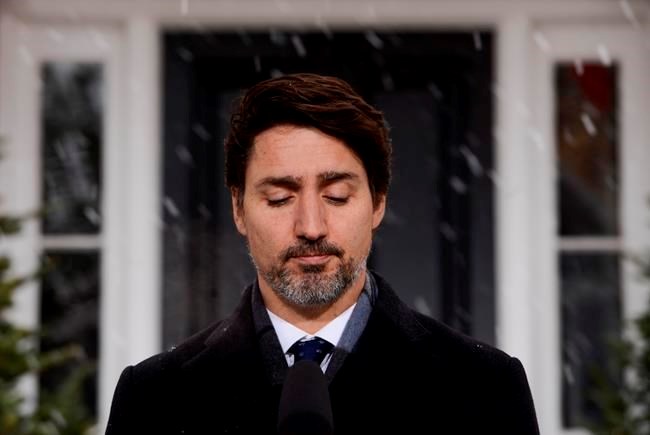Saturday marks one month since the World Health Organization declared COVID-19 a global pandemic.
Here are some key developments for Canada since then:
March 11: Prime Minister Justin Trudeau promises $1 billion for COVID-19 to help the health-care system and workers force to self-isolate ... Canada has more than 100 cases ... Stock market plunges ... A Utah Jazz player tests positive for COVID two days after a game against the Toronto Raptors, causing the NBA to suspend its season.
March 12: Trudeau self-isolates after his wife tests positive for COVID ... Social distancing ramps up ... Stocks continue falling ... The NHL and most other sports leagues suspend seasons ... The Juno Awards are shelved ... Minor hockey across the country is cancelled ... Schools in Ontario announce they'll be closed for two week after March break ... Manitoba and Saskatchewan report their first cases.
March 13: Trudeau promises more direct aid to Canadians ... Government announces parliament will go on break ... Supermarkets see panic buying. Mosques announce closures.
March 14: Government scrambles to get stranded Canadians home ... Ottawa opens first assessment centre ... Quebec tells seniors to stay home.
March 15: Trudeau urges against panic buying ... Nova Scotia gets its first three cases.
March 16: Apart from Americans and a few exceptions, Canada announces it is closing its borders to non-Canadians ... Trudeau addresses the nation as governments and businesses take drastic measures to stem the spread of COVID-19.
March 17: Ontario and Alberta declare states of emergency ... Feds say they will isolate irregular border-crossers for COVID-19.
March 18: Trudeau promises $82 billion in financial aid ... Governments announce Canada-U.S. border to close to non-essential traffic ... The country's six big banks announce they are going to let customers defer mortgage payments for up to six months ... B.C. and Saskatchewan declare states of emergency.
March 19: Feds roll out $27 billion in new spending and $55 billion in credit to help families and businesses ... New Brunswick declares state of emergency.
March 20: COVID-19 cases pass 1,000 ... Trudeau says asylum seekers crossing into Canada on foot from the U.S. will be turned back as part of the border shutdown ... About 4,000 Canadians are trapped on cruise ships ... Manitoba declares state of emergency
March 21: U.S.-Canada border officially closes to non-essential travel ... Provinces start backing up isolation measures with police.
March 22: Quebec closes shopping malls, restaurants and salons ... Canada says it won't compete in Tokyo Olympics or Paralympics if held this summer
March 23: Federal government rolls out $30-million advertising campaign focuses on social distancing and personal hygiene ... Canada announces repatriation flights for those stranded.
March 24: Olympics officially postponed until next year ... Political fight starts in Ottawa to pass COVID emergency aid legislation ... Community transmission overtakes travel-related spread.
March 25: Emergency aid bill passes ... Canada makes 14-day quarantine for arrivals mandatory.
March 26: Feds ask banks and credit card companies to lower interest rates ... Report says U.S. President Donald Trump might put troops at Canadian border ... Federal Conservatives announce suspension of leadership race.
March 27: Bank of Canada cuts key rate to 0.25 per cent ... Canadian Forces put on war footing.
March 28: Trudeau announces ban on air travel for those with COVID symptoms ... Sophie Gregoire Trudeau says she has recovered.
March 29: Trudeau says he'll be staying home another two weeks ... Trudeau says thousands of medical masks, gowns, gloves and goggles expected to arrive from China will be thoroughly inspected by Health Canada before being distributed to hospitals.
March 30: Defence Minister Harjit Sajjan says 24,000 Canadian troops ready to help deal with COVID-19 ... Trudeau says new wage subsidy program will cover all businesses whose revenue has dropped by at least 30 per cent because of COVID-19.
March 31: Ventilator production ramps up.
April 1: Trudeau says length of the lockdowns will depend on the behaviour of Canadians ... Ottawa warns of possible drug shortages ... Trudeau says it appears U.S. will not put troops at border.
April 2: Canada, NATO allies discuss COVID-19 response ... COVID-19 death toll passes 100.
April 3: Ontario projects COVID-19 death toll could reach 15,000 ... Big banks allow mortgage deferrals ... Quebec calls in the Armed Forces.
April 4: 3M told by the White House to stop exporting N95 respirators to Canada.
April 5: Federal government announces more financial aid for the most vulnerable Canadians ... Dr. Theresa Tam, Canada's leading doctor, says hospitals should not throw out face masks and other protective equipment.
April 6: 3M makes deal with the White House to provide N95 masks to Canada ... Canadians start applying for emergency aid ... Tam says wearing masks is a way for people who might have COVID-19 without realizing it to keep from spreading the illness.
April 7: A seniors home in Montreal reports more than 100 infections and eight deaths ... Ottawa orders 30,000 ventilators.
April 8: Quebec becomes the province with the most COVID-19 fatalities — at 175 ... Canada's deputy minister of foreign affairs, Marta Morgan, tests positive for COVID-19.
April 9: Ottawa projects 4,400 to 44,000 Canadians could die of COVID-19. Government announces more than one million people lost their jobs in March.
April 10: RCMP warns people it could make home visits to enforce the Quarantine Act. Trudeau says it's possible some restrictions will be lifted by the summer.
April 11: Wage Subsidy Bill is passed, helping businesses impacted by the COVID-19 crisis ... Quebec says 31 people have died in a Montreal-area long-term care home since March 13.
This report by The Canadian Press was first published April 11, 2020.
Colin Perkel and Jaclyn Tansil, The Canadian Press




